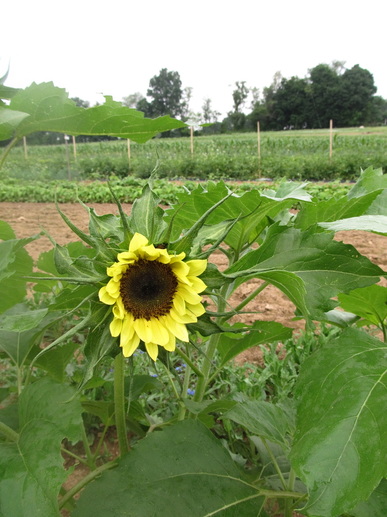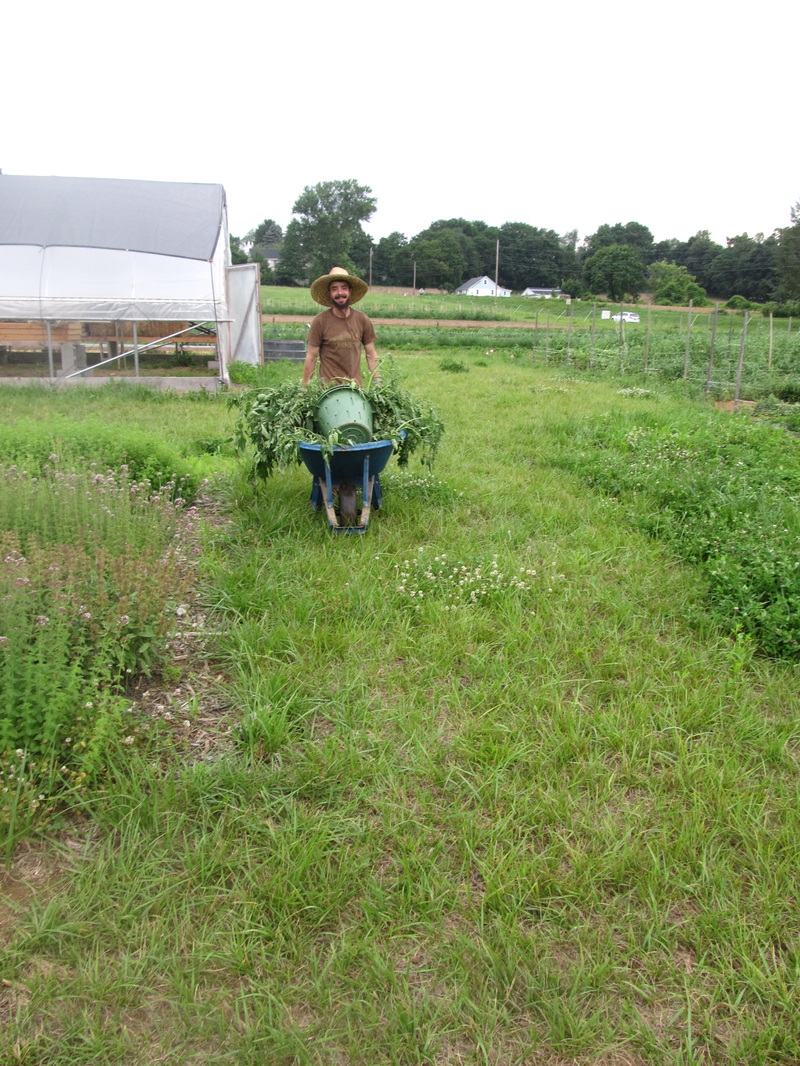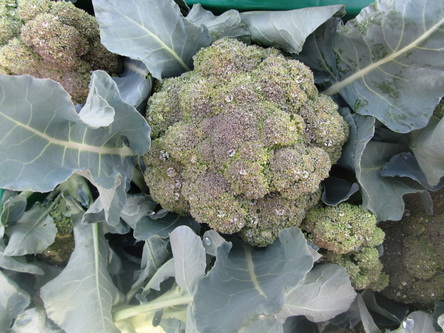|
"The real name of our connection to this everywhere different and differently named earth is 'work.' We are connected by work even to the places where we don't work, for all places are connected; it is clear by now that we cannot exempt one place from our ruin of another. The name of our proper connection to the earth is 'good work,' for good work involves much giving of honor. It honors the course of its materials; it honors the place where it is done; it honors the art by which it is done; it honors the thing that it makes and the user of the made thing. Good work is always modestly scaled, for it cannot ignore either the nature of individual places or the differences between places, and it always involves a sort of religious humility, for not everything is known. Good work can be defined only in particularity, for it must be defined a little differently for every one of the places and every one of the workers on earth." Wendell Berry Conservation is Good Work 1991 Dear Members, Family, Neighbors, and Friends,
As self-aware as we may each tout ourselves as being, most of us (who are above the age of 8 or 9) only come to realize things after they have gone and happened. As Spring came in hot and dry, it seems I spent much of April and May waiting for the rain to come before I could pause long enough to take a breath with integrity, a full and deep one saturating the belly and lungs and blood and brain with oxygen and relief. For weeks and weeks I think the air had gotten stuck in a clog somewhere in my throat, which is often not conducive to many activities: thinking, smiling, relaxing, finding joy in the quotidian. Instead of supporting plants to grow, the Spring felt like a trial in getting plants to stay, merely, alive, in getting seeds to, at least, germinate. Anton mastered the irrigation (or as our farmer friend Steve likes to call it, “irritation”) dance: moving hoses, checking pressure, cleaning the filter, running the pump, moving hoses again. And then, there was rain. Alongside the arrival of rain, CSA pick-ups began; members and farmers alike are thrilled to have fresh greens, fruits, and roots in their fridges. Though I probably wrote this last year, and I'll probably write this again next year, it is always an affirmation and a testament to our work to have the many families and neighbors who are a part of our farm arrive and take home these vegetables which we work so hard to grow. Why is this work important? A man driving by called to me from the road, wanting to buy eggs. It was nearing 8 p.m.; I was weeding carrots and waiting for the chickens to go into the coop for the night, so I, too, could go to my coop for the night. He was flabbergasted, and obviously offended by the price, gesturing toward somewhere that wasn't this farm “but I can get them for $2.00!” I started to talk about organic feed and off-handedly mentioned GMOs, quickly running through the gambit: health benefits, humanely raised hens, taste and quality, blah blah blah; I could watch him stop listening to me as soon as I told him how much I needed to make off of a dozen eggs in order to make some semblance of a living, in order to raise and care for chickens in the only way which I believed chickens should be raised and cared for. I walked away feeling disappointed: it wasn't that he wasn't going to buy our eggs, or that he wasn't going to be swayed by my tired and half-hearted response, it was that he appreciated the vision of the farm we worked so hard to create--admiring the hens meandering through forests of clover and rows of onions enough to stop and ask to buy them--but he, like many, did not value these things enough to pay me a living wage to farm them. Farming is work of sacrifice. Farming, like so many other things worth doing: parenting, creating, educating, loving, healing, forgiving, growing beyond the limits one previously set for one's self, is work of sacrifice. Here are a list of things one might sacrifice in order to farm: weekends, nightly dinners together at home, sleep, freedom from the tirades of weather events and one's economic circumstances being tied to said weather events, leisurely Sunday morning pancake breakfasts, summer vacations, financial wealth, the integrity of the physical body. In return, like so many things worth doing, the gifts are many. I often wonder what it is worth to people to have a working farm in their community which grows honest food for human consumption, whether they are a CSA member, someone who commutes along King's Highway twice a day to and fro work, or a neighbor who takes a daily walk on their lunch break. Sometimes, in bitterness and cynicism, when I am tired and hungry and feeling discouraged by every circumstance around me, I ask in frustration, like a petulant child: What Is It Worth? Sometimes, I find peace in my heart, and I ask politely to the universe, out of interest and curiosity and a desire for a sincere dialogue with anyone who wishes to voice their insight: What Is It Worth? I am not talking about money, though I guess it all comes down, eventually, one way or another, to money. I am talking about the ability to continue doing the work we do, to make this farm truly sustainable. I am talking about quality of life, about creating a home, about finding the strength and circumstances whereby we can continue to serve the human and earthly communities around us to the best of our knowledge and abilities. It sounds crazy in the context of a world of instant twitter feeds, soon-to-be-self-driving cars, and globalized economies: but we are looking for that which my and your ancestors were looking for: a place to bury our dead and birth the new; a place to tend and spread a pile of compost; a place to wake and sleep and work which is all one in the same, which we will leave, if nothing else, to the next generation; a place to rest our bodies when they are too old and tired and worn to do the work which for so many years sustained us in our living; a place out of which we can do good work. A neighboring farmer stopped by the other day who we had never met before, to talk about this and that. He said, “Everyone wants to know if we grow 'sustainably,' if our produce is 'sustainable.' They're talking about if we use synthetic pesticides: but I want to talk about real sustainability, about economic sustainability. That's the hard part.” I see people come alive when they experience a farm. I see cars, every day, slow down to look at long rows of crops, to look at young not-quite-Amish-enough-looking people using horses to mow cover crop or plow fields, to look at chickens pecking around a pasture searching for nobody-knows-what. People regularly stop, or call me on the phone--people who have no economic ties to our farm--and tell me how they and their children watch the progress of the farm as they drive by. One woman tells me her three-year-old grandson calls our farm, “My farm, My farm!” even though he has never been here. These people are interested, invested in something they cannot define, looking for something which is lacking in many aspects of life around us: slow living, real food, agrarianism, open space, authenticity, integrity, flavor, an unnamed feeling--a reminder of the work of their parents or grandparents, a respect for the land--one which only comes out of a connection to it. I see fascinated, nervous, curious children meeting hens who laid the eggs they'll eat for breakfast. I see grown-ups in their high-heals straight from work picking strawberries, surprised and delighted at the unadulterated taste of an in-season ripe berry still warm from the sun. I hear people tell me how CSAs have changed their diets and their lives--they eat better than they ever have before, they miss the produce all winter long, they have been looking forward to coming to the farm for months. Families linger here, picking, tasting, pausing, connecting. How do we translate that Worth, and let it find concrete grounding to create a farm of real sustainability, one which correctly honors the community who is being fed, honors the place where the work is done, and honors the doer of the work? When I witness these moments, these stories, these expressions of appreciation, it is evident that the Worth of a working farm remaining alive within our community is great. The question then becomes one of quantifying and giving value to that Worth in order to create sustainable farms, and sustainable communities. Economic boundaries shift: it is not a matter of simply “buying local” or of farmers raising the price of their goods (and consumers being able and willing to pay that price), it is a matter of expanding the relationship between the farmer and the “consumer,” i.e., the community in which that farmer is grounded. Of each party asking the other: What can I offer? And. What do you need? The answers are complicated, and sometimes it seems easier just go to the grocery store, but I believe in the end we will be creating a transparent, just, and resilient food system. Thanks for joining us for the ride. Please unbuckle your safety belts and keep your hands and feet outside. The road is likely to be a bumpy one. In Deep Breaths and July Flowers, Your Farmers, Lisa and Anton
Samuel
7/31/2015 12:10:29 pm
This is beautiful, and I can relate in many ways. I saw your farm this last weekend, and it is wonderful. You are doing a great job and you are changing the world. Keep up the good work at good work farm. You are a good writer and maybe should pursue Wendell Berry styled musings. Write some essays and get them published in small farmers journal.
STEVE BERTSCH
9/3/2015 05:06:54 am
visited 2 day 9/3/15 I do organic gardening near Valley Forge PA. Comments are closed.
|
Archives
December 2019
FarmersAnton M. Shannon Categories
All
|




 RSS Feed
RSS Feed